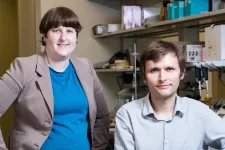(Press-News.org) Two Rice University bioengineers received the National Institutes of Health (NIH) Director’s New Innovator Award (NIA) for creative research projects demonstrating broad impact potential.
Part of the High-Risk, High-Reward Research program, NIA awards support early-career investigators with ambitious, unconventional project proposals “in any area of biomedical, behavioral or social science research relevant to the NIH mission,” according to the agency’s website.
Rice’s Jerzy Szablowski and Julea Vlassakis will use the grants for their individual projects. Szablowski is developing a noninvasive, high-resolution method of mapping gene expression, and Vlassakis is studying complex, single-cell level processes and interactions in a model of pediatric bone cancer.
It is the first time that Rice researchers received the distinction.
“It’s like lightning struck the same spot twice,” Vlassakis said, noting the highly competitive selection process. Szablowski added that the awards are “pretty unique compared to typical NIH grants,” offering a greater amount of freedom to explore and innovate.
“Science can be quite unpredictable, so this allows us to take greater risks that could lead to transformative outcomes,” he said.
Szablowski’s research project is focused on developing synthetic markers carried in the bloodstream that relay detailed information on how genes get expressed in the brain. Known as “Released Markers of Activity” or RMAs, these reporters can provide information on as few as 100 cells or fewer, making them a high-sensitivity tool applicable to a variety of monitoring purposes.
“Gene expression underlies a lot of different biological processes,” said Szablowski, an assistant professor of bioengineering. “But because this process takes place inside cells, you can’t spy on it unless you go inside the cell and mash it up and analyze its contents. This is not ideal when you’re trying to keep track of something that’s happening deep inside tissue over time.
“The ability to monitor gene expression with a blood test would allow you to track how a single area of tissue changes over time and learn, for example, what makes some people susceptible to developing an addiction or an illness like Parkinson’s.”
RMAs are especially useful for surveilling parts of the body that are difficult or dangerous to sample, like the spinal cord or the brain.
“We have tools to noninvasively deliver genes to tissues,” Szablowski said. “This tool makes it possible to measure the gene expression noninvasively in a way that simply wasn’t possible beforehand.”
The markers can also be used to track neuronal activity to assess the effect of certain medications or to study how the brain processes pain or anxiety. This could potentially allow researchers to more accurately diagnose pain or anxiety disorders and lead to more effective therapies.
“We’re particularly interested in applications of this kind of recording in anxiety-related disorders,” Szablowski said. “RMAs will allow us to measure how the brain responds to different anxiety-inducing environments and to compare these responses.”
The funding enables Szablowski to work on increasing the sensitivity of the synthetic markers to the single-cell level and on diversifying the range of physiological processes they monitor.
Vlassakis will use the grant to study how cancerous cells and immune cells interact, looking to shed light on the mechanisms that allow tumor cells to evade or repel immune defenses. Her work will focus specifically on Ewing sarcoma, the second most common pediatric bone cancer.
“We’ll study the interplay between cells that leave from the tumor and spread elsewhere in the body and the immune system, which should be able to recognize those cells as not normal and shut down the process,” said Vlassakis, an assistant professor of bioengineering and a Cancer Prevention and Research Institute of Texas (CPRIT) Scholar. “But, in fact, immune cells don’t do a very good job of identifying spreading cancer cells.”
Vlassakis seeks to recreate the kinds of intercellular interactions that take place as a tumor is spreading using detailed, three-dimensional models that replicate the tumor microenvironment.
“There really hasn’t been a model for Ewing sarcoma that encompasses the tumor, the immune cells and a material that best mimics bone environment,” Vlassakis said.
Vlassakis is also developing ways to extract individual cells from the models and analyze their make-up and behaviors at the protein level.
“We care about measuring single cells because there’s some variation from cell to cell that can be meaningful in terms of which cells are the ones aggressively invading the environment and driving the cancer to spread versus the less migratory cells,” Vlassakis said. “Ultimately, those cells will have distinct proteins that they’re expressing that are helping them carry out their specific function.”
Understanding individual differences between cells may help uncover ways to interrupt metastatic processes, Vlassakis said. But in order to analyze them, she has to lure the cells into tiny devices designed to measure the proteins they express, their structure and more.
“By sprinkling in some factors that the cells are known to gravitate towards, we’re aiming to get them to migrate into microwells that we design that are part of our single-cell protein-measurement devices,” Vlassakis said. “We’re really interested in integrating single-cell measurement technologies as we probe the biology of cells in these tumor models.”
The technologies Vlassakis is working on could be used to measure and observe other types of cells, laying the groundwork for more fine-grained analyses of various other cancers and disease states such as autoimmune disorders.
“We’re just learning more and more about the importance and really mystifying nature of the immune system,” Vlassakis said. “Getting this award is a great honor, and it’s really exciting to get the resources and time to delve more deeply into this research.”
-30-
This release can be found online at news.rice.edu.
Follow Rice News and Media Relations via Twitter @RiceUNews.
Award information:
“Monitoring neuronal activity with a blood test - Released Markers of Activity (RMA)” | National Institute of Biomedical Imaging and Bioengineering | Principal Investigator: Jerzy Szablowski | Project number: 1DP2EB035905-01
https://reporter.nih.gov/search/tqAPqmyRFUCr72wLKQRQNw/project-details/10687503
“Deep phenotyping of fusion oncoprotein-driven pediatric cancer metastasis with single-cell proteomics” | National Cancer Institute | Principal Investigator: Julea Vlassakis | Project number: 1DP2CA290802-01
https://reporter.nih.gov/search/tqAPqmyRFUCr72wLKQRQNw/project-details/10687394
Image downloads:
https://news-network.rice.edu/news/files/2023/09/230925_NIH_Fitlow_7811.jpg
CAPTION: Julea Vlassakis (left) and Jerzy Szablowski have won the NIH Director’s New Innovator Award. (Photo by Jeff Fitlow/Rice University)
https://news-network.rice.edu/news/files/2023/10/230925_NIH_Fitlow_7802.jpg
CAPTION: Jerzy Szablowski is an assistant professor of bioengineering at Rice University. (Photo by Jeff Fitlow/Rice University)
https://news-network.rice.edu/news/files/2023/09/230925_NIH_Fitlow_7794.jpg
CAPTION: Julea Vlassakis is an assistant professor of bioengineering and a Cancer Prevention and Research Institute of Texas (CPRIT) Scholar. (Photo by Jeff Fitlow/Rice University)
Related stories:
DARPA grant will fund hunt for drug that can keep people warm:
https://news.rice.edu/news/2023/darpa-grant-will-fund-hunt-drug-can-keep-people-warm
Rice bioengineer seeks better signals from cells:
https://news.rice.edu/news/2022/rice-bioengineer-seeks-better-signals-cells
Szablowski receives Michael J. Fox grant for Parkinson’s Research:
https://bioengineering.rice.edu/news/szablowski-receives-michael-j-fox-grant-parkinsons-research
Bioengineering department adds single-cell expert via CPRIT grant:
https://news.rice.edu/news/2021/bioengineering-department-adds-single-cell-expert-cprit-grant
Links:
Department of Bioengineering: https://bioengineering.rice.edu/
Microtechnologies Laboratory for Pediatric Oncology: https://vlassakislab.rice.edu/
Laboratory for Noninvasive Neuroengineering: https://www.szablowskilab.org/
Cancer Prevention and Research Institute of Texas (CPRIT): https://www.cprit.texas.gov/
Located on a 300-acre forested campus in Houston, Rice University is consistently ranked among the nation’s top 20 universities by U.S. News & World Report. Rice has highly respected schools of Architecture, Business, Continuing Studies, Engineering, Humanities, Music, Natural Sciences and Social Sciences and is home to the Baker Institute for Public Policy. With 4,240 undergraduates and 3,972 graduate students, Rice’s undergraduate student-to-faculty ratio is just under 6-to-1. Its residential college system builds close-knit communities and lifelong friendships, just one reason why Rice is ranked No. 1 for lots of race/class interaction and No. 4 for quality of life by the Princeton Review. Rice is also rated as a best value among private universities by Kiplinger’s Personal Finance.
END
Two Rice bioengineers win NIH Director’s New Innovator awards
Jerzy Szablowski, Julea Vlassakis honored for “highly innovative research”
2023-10-03
ELSE PRESS RELEASES FROM THIS DATE:
A promising treatment on the horizon for cancer-related fatigue
2023-10-03
Cancer-related fatigue (CRF) is a debilitating yet all-too-common condition, which can severely affect quality of life for patients undergoing treatment. For those struggling with CRF, there have been no effective pharmaceutical treatments for the constellation of symptoms that together define the syndrome.
In a new study led by Yale Cancer Center researchers at Yale School of Medicine, the team found that a metabolism-targeting drug called dichloroacetate (DCA) helped alleviate CRF in mice, without interfering with cancer ...
NRG Oncology-RTOG 1308 accrual completion: First phase III NCTN clinical trial comparing photon versus proton therapy to meet accrual target
2023-10-03
Effective September 26, 2023, NRG Oncology-RTOG 1308, a phase III randomized trial comparing overall survival after photon versus proton chemoradiotherapy for patients with inoperable stage II-IIIB non-small cell lung cancer (NSCLC) has met its accrual target. The trial, one of several NRG Oncology ongoing clinical trials across various malignancies within the National Clinical Trials Network (NCTN) that compare photon versus proton radiation therapy techniques, is the first phase III head-to-head comparison of these ...
Carbon capture method plucks CO2 straight from the air
2023-10-03
Even as the world slowly begins to decarbonize industrial processes, achieving lower concentrations of atmospheric carbon requires technologies that remove existing carbon dioxide from the atmosphere — rather than just prevent the creation of it.
Typical carbon capture catches CO2 directly from the source of a carbon-intensive process. Ambient carbon capture, or “direct air capture” (DAC) on the other hand, can take carbon out of typical environmental conditions and serves as one weapon in the battle against climate change, particularly as reliance ...
Dr. Tanya Stoyanova receives Department of Defense award to find new lung cancer treatments
2023-10-03
Dr. Tanya Stoyanova, associate professor of molecular and medical pharmacology and urology at the David Geffen School of Medicine at UCLA, was awarded a $350,000 Idea Development Award from the Department of Defense.
The award will help Stoyanova, a member of the UCLA Jonsson Comprehensive Cancer Center, to identify new cancer detection and treatment strategies for small cell lung cancer, a highly aggressive form of the disease that accounts for approximately 15% of lung cancers. Known for spreading quickly, most people diagnosed with the disease face low chances of survival beyond five years.
The award ...
Carol L. Silva elected fellow of the National Academy of Public Administration
2023-10-03
Carol L. Silva, the Edith Kinney Gaylord Presidential Professor of Political Science in the Dodge Family College of Arts and Sciences and Senior Associate Vice President for Research and Partnerships at the University of Oklahoma, has been elected a 2023 fellow of the National Academy of Public Administration.
“Carol is an experienced, dynamic leader with an extensive record of excellence in research and building successful multidisciplinary programs and convergent teams focused on grand challenge problems at the intersection of public policy and technology. We congratulate her on this election to the NAPA and look forward to the impact she will make among these national thought ...
Independent physician practices can keep up with larger consolidated practices in a pandemic
2023-10-03
Large health systems are acquiring smaller physician practices at what some consider an alarming rate, leaving fewer independent practices. When the COVID-19 pandemic occurred, it was unclear whether the independent practices would be able to “keep up” (maintain the same level of patient care) with larger practices, which have more resources, and if care for patients with chronic conditions might be disrupted by the pandemic.
A new study from Associate Dean of Research Alison Cuellar found that independent practices experienced a smaller drop in patient volume than ...
Join GSA in Tampa for the Nation’s Premier Aging Conference!
2023-10-03
The Gerontological Society of America (GSA) invites all journalists to attend its 2023 Annual Scientific Meeting — the country’s largest interdisciplinary conference in the field of aging — from November 8 to 12 in Tampa, Florida. Qualified media representatives intending to cover the meeting may register free of charge.
More than 3,000 professionals are expected to attend the five-day gathering at the Tampa Convention Center. The theme for 2023 is “Building Bridges > Catalyzing Research > Empowering All Ages,” and the program schedule contains ...
Female animals may learn mate preferences based on what sets other females’ choices apart from the crowd
2023-10-03
Females may infer what makes a male attractive by observing the choices of more experienced females, and the context of those choices matters, according to a mathematical model publishing October 3rd in the open access journal PLOS Biology. Rather than simply copying their peers, females might learn to prefer rare traits that set successful males apart from others, Emily DuVal at Florida State University, US, and colleagues report.
Sexual selection — where traits become more common because of their attractiveness to the opposite sex — can produce strange and elaborate characteristics, such as huge antlers, bright plumage, and ...
Despite increasing rates of tuberculosis in prisons across the globe, current WHO TB prevention guidelines fail to reach incarcerated populations
2023-10-03
Despite increasing rates of tuberculosis in prisons across the globe, current WHO TB prevention guidelines fail to reach incarcerated populations. Programs should instead prioritize them, argue a group of researchers from Stanford, Harvard, UCL and a range of other global institutions.
#####
In your coverage, please use this URL to provide access to the freely available paper in PLOS Medicine: http://journals.plos.org/plosmedicine/article?id=10.1371/journal.pmed.1004288
Article Title: Prioritizing persons deprived of liberty in global guidelines for tuberculosis preventive treatment
Author Countries: United States
Funding: ...
Computer model predicts who needs lung cancer screening
2023-10-03
A machine learning model equipped with only data on people’s age, smoking duration and the number of cigarettes smoked per day can predict lung cancer risk and identify who needs lung cancer screening, according to a new study publishing October 3rd in the open access journal PLOS Medicine by Thomas Callender of University College London, UK, and colleagues.
Lung cancer is the most common cause of cancer death worldwide, with poor survival in the absence of early detection. Screening for lung cancer among those at highest risk could reduce ...
LAST 30 PRESS RELEASES:
Weill Cornell Medicine selected for Prostate Cancer Foundation Challenge Award
Largest high-precision 3D facial database built in China, enabling more lifelike digital humans
SwRI upgrades facilities to expand subsurface safety valve testing to new application
Iron deficiency blocks the growth of young pancreatic cells
Selective forest thinning in the eastern Cascades supports both snowpack and wildfire resilience
A sea of light: HETDEX astronomers reveal hidden structures in the young universe
Some young gamers may be at higher risk of mental health problems, but family and school support can help
Reduce rust by dumping your wok twice, and other kitchen tips
High-fat diet accelerates breast cancer tumor growth and invasion
Leveraging AI models, neuroscientists parse canary songs to better understand human speech
Ultraprocessed food consumption and behavioral outcomes in Canadian children
The ISSCR honors Dr. Kyle M. Loh with the 2026 Early Career Impact Award for Transformative Advances in Stem Cell Biology
The ISSCR honors Alexander Meissner with the 2026 ISSCR Momentum Award for exceptional work in developmental and stem cell epigenetics
The ISSCR honors stem cell COREdinates and CorEUstem with the 2026 ISSCR Public Service Award
Minimally invasive procedure effectively treats small kidney cancers
SwRI earns CMMC Level 2 cybersecurity certification
Doctors and nurses believe their own substance use affects patients
Life forms can planet hop on asteroid debris – and survive
Sylvia Hurtado voted AERA President-Elect; key members elected to AERA Council
Mount Sinai and King Saud University Medical City forge a three-year collaboration to advance precision medicine in familial inflammatory bowel disease
AI biases can influence people’s perception of history
Prenatal opioid exposure and well-being through adolescence
Big and small dogs both impact indoor air quality, just differently
Wearing a weighted vest to strengthen bones? Make sure you’re moving
Microbe survives the pressures of impact-induced ejection from Mars
Asteroid samples offer new insights into conditions when the solar system formed
Fecal transplants from older mice significantly improve ovarian function and fertility in younger mice
Delight for diastereomer production: A novel strategy for organic chemistry
Permafrost is key to carbon storage. That makes northern wildfires even more dangerous
Hairdressers could be a secret weapon in tackling climate change, new research finds
[Press-News.org] Two Rice bioengineers win NIH Director’s New Innovator awardsJerzy Szablowski, Julea Vlassakis honored for “highly innovative research”







